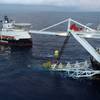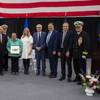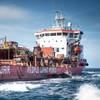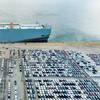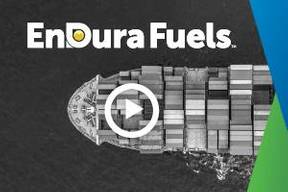Waterways Plan Sent to Congress
The Inland Waterways Users Board adopted a final report that accompanies a new comprehensive, consensus-based package of recommendations formulated by an industry and U.S. Army Corps of Engineers working group to improve the continued vitality of the U.S. inland navigation system over the next 20 years. The report and recommendations are being sent to Congress and if adopted, will better address the needs of the entire system and provide more dollars for greatly needed infrastructure improvements. The Users Board is a federal advisory committee that provides advice to Congress and the Assistant Secretary of the Army (Civil Works).
This proposal is supported by industry stakeholders (see the current list of supporters at bottom of release) and government as a way to fund the navigation system and would be in lieu of the imposition of a lockage fee that has been unsuccessfully offered in the last two fiscal year budgets and is strongly opposed by Waterways Council, Inc. (WCI), the American Waterways Operators (AWO), and the National Waterways Conference (NWC), as well as many Members of Congress.
Finalized in December and incorporated in a final report approved by the Users Board today, the recommendations were developed over a year-long period by the Inland Marine Transportation System Investment Strategy Team, composed of key U.S. Army Corps of Engineers personnel and members of the Users Board. Many in Congress have been very supportive of the process to create this set of recommendations.
The proposed recommendations and report prioritize navigation projects across the entire system, improve the Corps of Engineers’ project management and processes to deliver projects on time and on budget, and recommend a funding mechanism that is affordable and meets the system’s needs.
“More than 150 stakeholders in industry have signed on to support this consensus-based long-term Inland Waterways Capital Development Plan that we feel will help our nation to continue to enjoy the benefits of our energy-efficient, congestion-relieving U.S. waterways transportation system,” said Cornel Martin, WCI President & CEO. “The recommendations urge funding parameters for the entire system rather than simply on a project by project basis, and will help us to address more of the system’s critical projects now in order to complete them more efficiently.”
The recommendations would preserve the existing 50/50 (50% industry/50% federal) cost-sharing formula for new lock construction and major rehabilitation projects costing $100m or more, while adjusting the current model to provide that dam construction and smaller rehabilitation projects would be 100% federally funded. These adjustments recognize the value derived by other beneficiaries of dams and the pools created by dams.
Also recommended is a cost-share cap on all new lock construction projects that would preserve the Inland Waterways Trust Fund by preventing the industry from having to fund significant cost overruns.
These new recommendations would necessitate an increase in the 20-cents-per-gallon fuel tax currently paid by the barge and towing industry, the only users of the system who are taxed. Industry spokespersons called the increase an investment by industry in order to improve the future viability and efficiency of America’s inland waterways system.
“We must address the needs of our inland transportation system so that we can continue to move commerce efficiently on the inland waterways system, and we urge Congress to act on this pathway forward now,” Martin concluded.
NWC President Amy Larson echoed those sentiments in urging the Congress to adopt the proposal this year, noting that crucial infrastructure that is essential to our economic security and quality of life is not being properly rehabilitated or recapitalized.
AWO President & CEO Thomas Allegretti asserted, “This comprehensive package of recommendations deserves the support of every member of Congress who values our nation’s unique inland waterways transportation system and the benefits it delivers to America’s economy, environment, national security and quality of life. It is a thoughtfully constructed package of process improvements and funding mechanisms that will enhance the reliability of our nation’s most efficient transportation and strengthen U.S. global competitiveness.”



